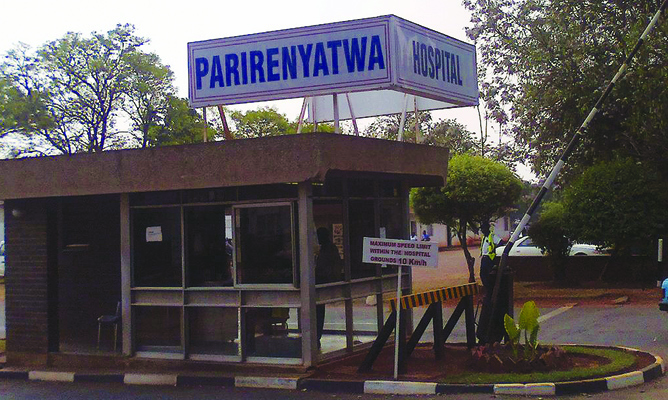
A MABVUKU family has come face to face with the grim reality of the doctors’ strike after their premature baby, born at 24 weeks and weighing just over 1,4kg, was discharged on Monday by Parirenyatwa Group of Hospital staffers, who cited shortages of critical staff to deal with the situation.
By Phyllis Mbanje
The baby was born on Friday evening and after spending only two nights in an incubator, was released into his mother’s care.
This is despite the fact that leading international health organisation World Health Organisation (WHO) prescribes that a 24-week old baby is considered extremely pre-term and has to be kept in neonatal intensive care unit (NICU) for weeks until his weight has stabilised and is breathing normally.
“I was told that because of the strike, they could no longer keep me. They even said my baby’s weight was fine after I voiced my concerns,” the baby’s mother Hilton Tandayi said.
A nurse, who requested anonymity, said a baby in that situation had to be admitted into the NICU.
“That one needs admission in NICU and kangaroo care. At Parirenyatwa, acceptable weight for discharge should be at least 1,8kg,” she said.
A first-time mother and only 21 years of age, Tandayi, from Manresa in Harare, is battling to offer her tiny baby the “kangaroo” care that has been recommended in the absence of neonatal intensive care facilities.
- Chamisa under fire over US$120K donation
- Mavhunga puts DeMbare into Chibuku quarterfinals
- Pension funds bet on Cabora Bassa oilfields
- Councils defy govt fire tender directive
Keep Reading
Kangaroo care involves holding the naked or partially dressed child against the bare skin of a parent to ensure that his temperature is within recommended range and that he is given expressed breast milk every three hours.
“I have not slept since I was discharged. The baby is in distress and I have to mostly stay naked to keep the baby warm,” she said with tears rolling down her cheeks.
Tandayi went into labour on Friday and gave birth at a clinic in Hatcliffe, but because it was a pre-term, she was transferred to Parirenyatwa.
“On Saturday, I was taken for kangaroo care preps along with other mothers. But I was surprised on Monday when a doctor (name supplied) discharged me and the baby,” she said.
“They gave us a watch to put around his tiny wrist which monitors his temperature. If it turns orange, it means he is cold and it sets off the alarm.”
Together with her sister, only identified as Bee, they have been monitoring the baby day and night.
Both are exhausted and worried about the welfare of the baby, who seems very agitated.
The sisters are appealing for help to ensure baby Tatenda is readmitted and given the special medical care he requires.
“Hilton’s baby came too early, so we were not prepared. We do not have clothes for him,” the sister said.
According to WHO, an estimated 15 million babies are born too early every year.
In low-income settings, half of the babies born at or below 32 weeks (two months early) die due to a lack of feasible, cost-effective care, such as warmth, breastfeeding support, and basic care for infections and breathing difficulties.
Meanwhile, most public health facilities in the country are faced with a crisis of certification of the deceased. Only doctors can certify death, but most are on strike.
Relatives of the deceased have had to wait longer than expected to collect the bodies of their loved ones.
However hospital authorities downplayed the crisis.
Director of operations at Parirenyatwa, Edson Mundenda, said initially, there had been some “delays”, but a resident doctor and the head of department and the deputy had contained the situation.
“When we realised that there was a full-fledged strike, we put contingency plans in place,” he said.
Harare Central Hospital chief executive officer Nyasha Masuka said they did not receive reports of instances were certification of deaths were not done timeously.
“We didn’t experience any problems certifying deaths during the month-long industrial action by doctors. We always had casualty officers on call. Certification was done on time,” he said.







